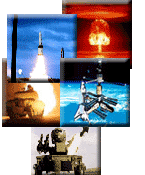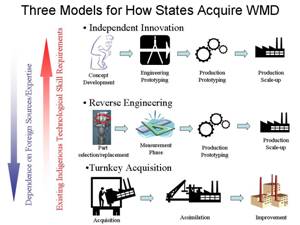
Massachusetts Institute of Technology • Program in Science, Technology and Society
Science, Technology and Global Security Working Group
Home
People
Research
Workshops
Contact Us
Understanding Successful Proliferators: How States Acquire WMD
Principal Investigator: Geoff Forden
ABSTRACT
Over the years, numerous countries have tried to acquire weapons of mass
destruction (chemical, biological, and nuclear weapons) and the means
to deliver them. The paths they have taken to acquire these weapons
are, of course, unique to each country. However, many of them
share certain commonalities. This research project attempts to
understand the factors that determine which path a country will follow
in just how successful it might be. Is our belief the understanding
the successful paths to acquiring weapons of mass destruction is the
best way of figuring out how to stop them.
This research cuts across all three categories of WMD as well as ballistic missiles to spot these commonalities. These include the acquisition of chemical biological and nuclear weapons by Iraq, Libya, and the United States as well as ballistic missile technology by India, Pakistan, and Iraq.
 A
state faces a daunting challenge when trying to acquire WMD. First,
it must not only acquire the weapon but also the means of producing significant
quantities. (Here it differs from terrorists, which need only produce
a few kilograms of chemicals or radioactive compounds or perhaps even
just a few grams of biological agents.) Second, the secrecy surrounding
WMD technologies would appear to be a major deterrent from a country
acquiring. It certainly does introduce difficulties, but unfortunately
our research has indicated that there are always people willing to sell
even most deadly of technologies.
A
state faces a daunting challenge when trying to acquire WMD. First,
it must not only acquire the weapon but also the means of producing significant
quantities. (Here it differs from terrorists, which need only produce
a few kilograms of chemicals or radioactive compounds or perhaps even
just a few grams of biological agents.) Second, the secrecy surrounding
WMD technologies would appear to be a major deterrent from a country
acquiring. It certainly does introduce difficulties, but unfortunately
our research has indicated that there are always people willing to sell
even most deadly of technologies.
Publications
How the Worlds Most Underdeveloped Nations Get the Worlds Most Dangerous Weapons, Technology and Culture, Vol. 48, no. 1, (January 2007) pp. 92-103.
Avoiding Enrichment: Using Financial Tools to Prevent Another Khan Network, Geoffrey Forden, Arms Control Today, June 2005, pp. 14-19.
Saddam’s Frenetic Final Month, Geoffrey Forden, Precis, Spring 2004, Vol. XIII, no. 2, pp. 6-8.
Intention to Deceive: Iraqi Misdirection of UN Inspectors, Geoffrey Forden, Jane’s Intelligence Review, March 2004, pp. 30-39.
PresentationsCenter for International Security and Cooperation, Stanford University, 26 April 2006.
Princeton University, Program on Science and Global Security, 23 February 2005
RAND Corp., Washington D.C., 21 January 2005
Managing the Atom Program, Belfer Center, Harvard University, 9 November 2004.
Non-Proliferation of WMD Delivery Systems, Potsdam, Germany, (a conference sponsored by the German Federal Foreign Office) 1 November 2004.
![]() Massachusetts
Institute of Technology • Science, Technology and Global Security
Working Group
Massachusetts
Institute of Technology • Science, Technology and Global Security
Working Group
Building
E51-163 •70
Memorial Drive • Cambridge, MA 02142
Copyright © 2009
Last modified: 30 April 2009